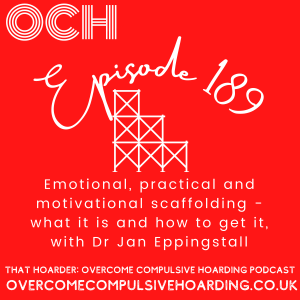
Friday Jun 06, 2025
#189 Emotional, practical and motivational scaffolding - what it is and how to get it, with Dr Jan Eppingstall
- Come to a Dehoarding Accountability Zoom Session: http://www.overcomecompulsivehoarding.co.uk/ticket
- Subscribe to the podcast: https://www.overcomecompulsivehoarding.co.uk/subscribe
- Podcast show notes, links and transcript: http://www.overcomecompulsivehoarding.co.uk/
This week I’m joined by Dr Jan Eppingstall to talk about scaffolding - what it means, how it helps with hoarding recovery, and why our needs for support change over time.
We break down practical, emotional, and motivational scaffolding, from therapy and peer support to self-made systems and the way we talk to ourselves.
If you’ve ever wondered how to find the right kind of help without feeling stuck with it forever, this is the episode for you.
Buy your copy of Everything You Need to Know About Hoarding by Dr Lynne Drummond at cambridge.org/EverythingHoarding, and get 20% off with the discount code HOARDING20. #ad
- Explanation of Scaffolding and the Zone of Proximal Development
- Definition of scaffolding from educational psychology.
- Origins in Lev Vygotsky’s work: helping people accomplish tasks with support.
- Relevance to hoarding and recovery.
- Application of Scaffolding to Hoarding Recovery
- Psychological, cognitive, and emotional elements in hoarding.
- Physical and organisational skill deficits in people who hoard.
- Differences and interplay between psychological barriers and practical skills.
- Illustrating support levels: from high assistance to independence.
- Personal examples demonstrating that support needs can resurface over time.
- The Changing Nature of Scaffolding
- Scaffolding shifts in form and amount as people progress or encounter setbacks.
- Individualisation: What’s supportive for one may not be for another.
- Types of Scaffolding for Hoarding Recovery
- External supports: therapists, peers, coaches.
- Direct instruction and physical assistance.
- Environmental modifications.
- Tools and resources.
- Social encouragement and accountability.
- Assessing current functioning.
- Matching support to challenge level (not too easy, not too hard).
- Gradually reducing support as independence grows.
- Scaffolding for Neurodivergent Individuals
- Adjustments for ADHD:
- Shorter work periods, built-in breaks.
- Accountability partners and visual reminders/checklists.
- Adjustments for Autism:
- Predictable routines.
- Clear rules and decision trees.
- Sensory-friendly environments.
- Executive Function Challenges and Tailored Scaffolding
- Strategies like breaking down decisions, using templates, "parking lot" systems for deferred decisions.
- Recognising that executive function can be context-specific and fluctuate.
- Importance of Emotional Scaffolding
- Emotional regulation during dehoarding.
- Need for self-soothing and distress-tolerance skills as support is reduced.
- Informal and Internal Scaffolding
- Peer support, self-talk, problem solving, reminders.
- Adapting systems in the home as a supportive structure.
- Habituation and Evolvement of Support Systems
- Reminder fatigue and strategies to combat it (rotating formats, colours, locations).
- The necessity for systems to evolve as needs and effectiveness change.
- Mindset Shifts and Realistic Expectations
- Acceptance that supports may need to be re-engaged during crises or setbacks.
- Not viewing return to scaffolding as failure - progress and healing aren’t linear.
- Testing assumptions about personal limitations.
- Re-evaluating and Customising Support
- Creating, testing, and modifying practical systems in the home with or without outside perspective.
- Recognising the value of trying new strategies even if initial skepticism exists.
Links
- Zone of Proximal Development
- The Metaphor of Scaffolding: Its Utility for the Field of Learning Disabilities, Stone, C. Addison, Journal of Learning Disabilities, 0022-2194, July 1, 1998, Vol. 31, Issue 4
- Podcast ep 183: ADHD, executive dysfunction and creating hacks and systems to reduce clutter chaos, with Carrie Lagerstedt
- Money Love podcast
- Podcast ep 127: Overcoming overspending with Paige Pritchard, Money Coach
- Come to a Dehoarding Accountability Zoom session: Accountability Booking Form
- Dr Jan Eppingstall at Stuffology
- https://www.facebook.com/stuffologyconsulting/
- https://twitter.com/stuff_ology
- https://www.instagram.com/stuff_ology/
- Dr Jan Eppingstall on Pinterest
- Website: Overcome Compulsive Hoarding
- Become a Dehoarding Darling
- Submit a topic for the podcast to cover
- Questions to ask when dehoarding: https://www.overcomecompulsivehoarding.co.uk/podquestions
- Instagram: @thathoarderpodcast
- Twitter: @ThatHoarder
- Mastodon: @ThatHoarder@mastodon.online
- TikTok: @thathoarderpodcast
- Facebook: Overcome Compulsive Hoarding with That Hoarder
- Pinterest: That Hoarder
- YouTube: Overcome Compulsive Hoarding with That Hoarder
- Reddit: Overcome Compulsive Hoarding with That Hoarder subreddit
- Help out: Support this project
- Sponsor the podcast
Subscribe to the podcast
No comments yet. Be the first to say something!